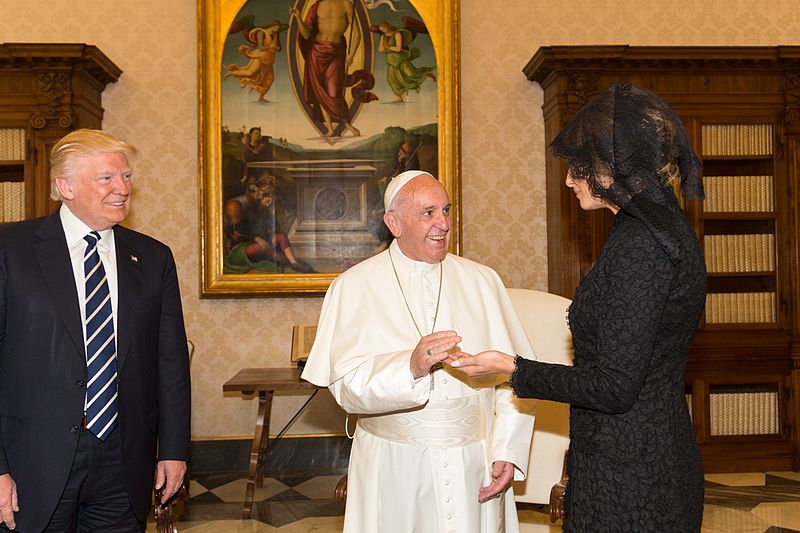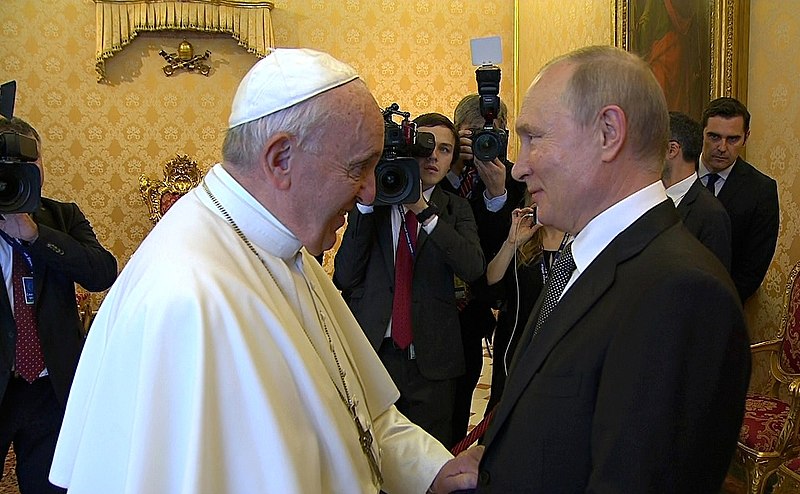長崎大学核兵器廃絶研究センター(RECNA=レクナ)が編集する英文のウェブ学術誌「平和と核軍縮」最新号が先月13日に刊行され、歴代教皇が核兵器について何を語ったかを改めて振り返る論文が掲載された。カナダ・サスカチュワン大学のクリストファー・フリンコウ准教授によるもので、原爆投下時のピオ12世から現在のフランシスコまでの歴代教皇の反核発言を紹介している。
同誌は2017年12月の創刊で、英国の出版社「テイラー&フランシス」によって年2回発行され、ウェブ上で無料公開している(レクナHPから閲覧可。日本語の要約あり)。今回刊行された第3号には、欧米やアジア、レクナなどの専門家による論文やインタビューなど21本が掲載されている。
その論文で触れられた教皇フランシスコの発言の一部を紹介する。
[toggle]as long as so great a quantity of arms are in circulation as at present, new pretexts can always be found for initiating hostilities. For this reason, I make my own the appeal of my predecessors for the non-proliferation of arms and for disarmament of all parties, beginning with nuclear and chemical weapons. [/toggle]広島と長崎の教訓を人類が学んでいないことは真実であり、実際に学んでいない。現在のように大量の兵器が流通している限り、敵対行為を始めるための新しい口実など、いつでも見つけることができる。その理由から私は、核兵器や化学兵器をはじめとする兵器の不拡散と、すべての関係国の軍縮のため、前教皇たちのアピールを私も訴えかけていく。
また、核兵器が平和への脅威となっていることを具体的に示す試みとして、2018年1月1日のカトリック「世界平和の日」に向けて、その前年末にフランシスコは、被爆直後の長崎で撮影された「焼き場に立つ少年」の写真をカードに印刷して配付した。これは、亡くなった弟を火葬するため、なきがらを背負って直立する少年を撮影したものだ。これについて教皇は「少年の悲しみは、唇を噛んで血が滲んでいる表情でしか表現されない」と説明した。また教皇は今秋、広島と長崎を訪問する。この教皇の旅では、招待された被爆者と直接対話する時間と、核兵器と戦争の危険性について断固とした発言をする舞台が予想される。
[toggle]War always does grave harm to the environment and to the cultural riches of peoples, risks which are magnified when one considers nuclear arms and biological weapons….Politics must pay greater attention to foreseeing new conflicts and addressing the causes which can lead to them. But powerful financial interests prove most resistant to this effort, and political planning tends to lack breadth of vision.[/toggle]戦争は常に、環境や人々の文化的豊かさに重大な被害を与える。核兵器や生物兵器を考えると、それがさらに拡大する危険性がある。政治家は新たな紛争を予見し、その原因に対処することについては、より注意を払わなければならない。しかし、戦争には強力な経済的利益があり、それがこの努力に最も抵抗する力であることを証明しており、政治的計画はそれによって視野を狭くさせられがちだ。

左からドナルド・トランプ米大統領、教皇フランシスコ、メラニア夫人(写真:Shealah Craighead)
[toggle]Never has humanity had such power over itself, yet nothing ensures that it will be used wisely, particularly when we consider how it is currently being used. We need but think of the nuclear bombs dropped in the middle of the twentieth century, or the array of technology which Nazism, Communism and other totalitarian regimes have employed to kill millions of people, to say nothing of the increasingly deadly arsenal of weapons available for modern warfare. In whose hands does all this power lie, or will it eventually end up? It is extremely risky for a small part of humanity to have it.[/toggle]核兵器が賢明に使われることを保証するものは何もない。20世紀半ばに投下された原子爆弾や、ナチズム、共産主義、その他の全体主義体制が、何百万もの人を殺害するために採用した一連の技術について考える必要がある。現代の戦争。この力は誰の手にあるのか。それとも最終的には終わるのだろうか。人類のごく一部がそれを持っていることは非常に危険だ。
[toggle]An ethics of fraternity and peaceful coexistence between individuals and among peoples cannot be based on the logic of fear, violence and closed-mindedness, but on responsibility, respect and sincere dialogue. Hence, I plead for disarmament and for the prohibition and abolition of nuclear weapons: nuclear deterrence and the threat of mutual assured destruction are incapable of grounding such an ethics. [/toggle]個人間や人々の間の友愛と平和的共存の倫理は、恐怖、暴力、閉ざされた心の論理ではなく、責任、尊敬、誠実な対話に基づく。それゆえ私は、軍縮と核兵器の禁止と廃止を求める。核抑止力と相互を確実に破壊する脅威は、そのような倫理を根拠づけることができない。

教皇フランシスコとプーチン・ロシア大統領(写真:The Presidential Press and Information Office)
[toggle]A certain pessimism might make us think that “prospects for a world free from nuclear arms and for integral disarmament”, the theme of your meeting, appear increasingly remote. Indeed, the escalation of the arms race continues unabated and the price of modernizing and developing weaponry, not only nuclear weapons, represents a considerable expense for nations. As a result, the real priorities facing our human family, such as the fight against poverty, the promotion of peace, the undertaking of educational, ecological and healthcare projects, and the development of human rights, are relegated to second place. Nor can we fail to be genuinely concerned by the catastrophic humanitarian and environmental effects of any employment of nuclear devices. If we also take into account the risk of an accidental detonation as a result of error of any kind, the threat of their use, as well as their very possession, is to be firmly condemned. For they exist in the service of a mentality of fear that affects not only the parties in conflict but the entire human race. International relations cannot be held captive to military force, mutual intimidation, and the parading of stockpiles of arms. Weapons of mass destruction, particularly nuclear weapons, create nothing but a false sense of security. They cannot constitute the basis for peaceful coexistence between members of the human family, which must rather be inspired by an ethics of solidarity. Essential in this regard is the witness given by the Hibakusha, the survivors of the bombing of Hiroshima and Nagasaki, together with other victims of nuclear arms testing. May their prophetic voice serve as a warning, above all for coming generations![/toggle]悲観論に立てば、私たちは、核兵器のない世界と完全な軍縮の見通しからますます遠ざかって見えるかもしれない。確かに、軍拡競争の激化は衰えることなく続いており、核兵器だけでなく、兵器の近代化と開発にかかる金額は国家にとってかなりの負担となっている。その結果、貧困との戦い、平和の促進、教育や生態系、医療プロジェクトの実施、人権の発展など、私たち人類が直面している真の優先事項は2番目に追いやられている。また、核兵器の使用による壊滅的な人道的・環境的影響を真に気にかけることもできていない。あらゆる種類の間違いの結果として偶発的に爆発する危険も考慮に入れれば、その使用の脅威は、まさにその所有物と同じように、しっかりと非難されるべきだ。彼らは、紛争の当事者だけでなく、人類全体にも影響を及ぼす恐怖心を与えているからだ。軍事力、相互の脅迫、軍備パレードによって国際関係を人質にすることはできない。大量破壊兵器、特に核兵器は、誤った安心感にほかならない。それらによっては人類間の平和的共存を築くことはできず、むしろそれは連帯の倫理に触発されて築かれるものだ。この点で重要なのは、核実験の犠牲者と共に、広島と長崎の原爆で生き残った被爆者という証人だろう。彼らの預言者としての声が何よりも次世代への警告として役立つように!

